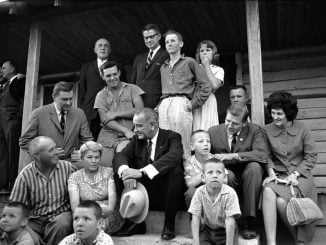
Nebraska Sen. Ben Sasse said it well recently when he stated that he was an “American first, a conservative second, and a Republican third.” Sasse’s point was that we endanger the Republic when we get those rankings out of order. The American historian H. Stuart Hughes noted that “conservatism is the negation of ideology.” The great conservative intellectual Russell Kirk expanded on this important truth. Kirk stressed understanding the human condition and the moral order for citizens, and in effect, how that helps to sustain a healthy nation. Fixed political ideology is less important than “a deep attachment to the permanent things.” Those non-material things that can never be replaced by collectivism or the state.
I was introduced to conservatism and to a lesser extent the Republican Party through Ronald Reagan’s presidency. I am just old enough to remember the election of 1984. In kindergarten, I knew that Walter Mondale wanted to raise taxes. I knew enough to understand that meant the government got more of your income and property.
My father, a retired Air Force pilot, was stationed in Saudi Arabia while my mom and brother and I were living in the Philadelphia suburbs close to my grandparents. Reagan was strong on defense and was generally seen as great for the military, so I was for Reagan. In what was a harbinger for the election, we took a poll in our kindergarten class on who our parents were voting for and Reagan won easily.
The 1980s were fraught with problems, many which seem much worse than today’s ailments. However, despite fringes on the far left, the nation was largely united in a common purpose — checking and even rolling back what was then a real Red Menace. Movies like Rocky IV and Red Dawn proved as much. In any event, Reagan was able to fuse together a broad and winning coalition of social conservatives, free-market libertarians, and national defense hawks.
In some respects, it’s hard to say where conservatism is headed today. Conservatism inherently needs a stable and healthy culture and we are anything but that now.
The two largest political forces appear to be populist movements spearheaded by Donald Trump on the right and Sen. Bernie Sanders on the left. Republican mismanagement of the conservative brand in Washington D.C. undoubtedly helped to usher in the Trump presidency. Some of his efforts have been good and some bad, but the collective freak-out over Trump only reinforces the problem with elevating politics over anything and everything in life. The collectivist sees the political sphere and the omnicompetent state as the best ways to perfect man and the created order.
Of course, conservatism charts a whole different path, well beyond merely the material world. It elevates the moral order and the virtues necessary for the ideals of self-government to succeed. “Freedom is the recognition that no single person, no single authority of government has a monopoly on the truth, but that every individual life is infinitely precious, that every one of us put on this world has been put there for a reason and has something to offer,” declared Ronald Reagan during his landmark address at Moscow University in 1988.
Conservatism is the best path forward for this nation because it posits the fact that the citizen under the authority of the Creator automatically limits the state. The conservative mind is essential today because it wreaks havoc on secularism and all its discontents.
One only needs to look to large swaths of the culture to see the despair of secularism. It inevitably leads to chaos and a lack of a deeper purpose and meaning. Conservatism is so essential going forward because it can recognize this and speak truth to our cultural despair and politics. Most importantly, conservatism often deals with universal truths and nothing is needed more for America today amid the clamoring darkness.



